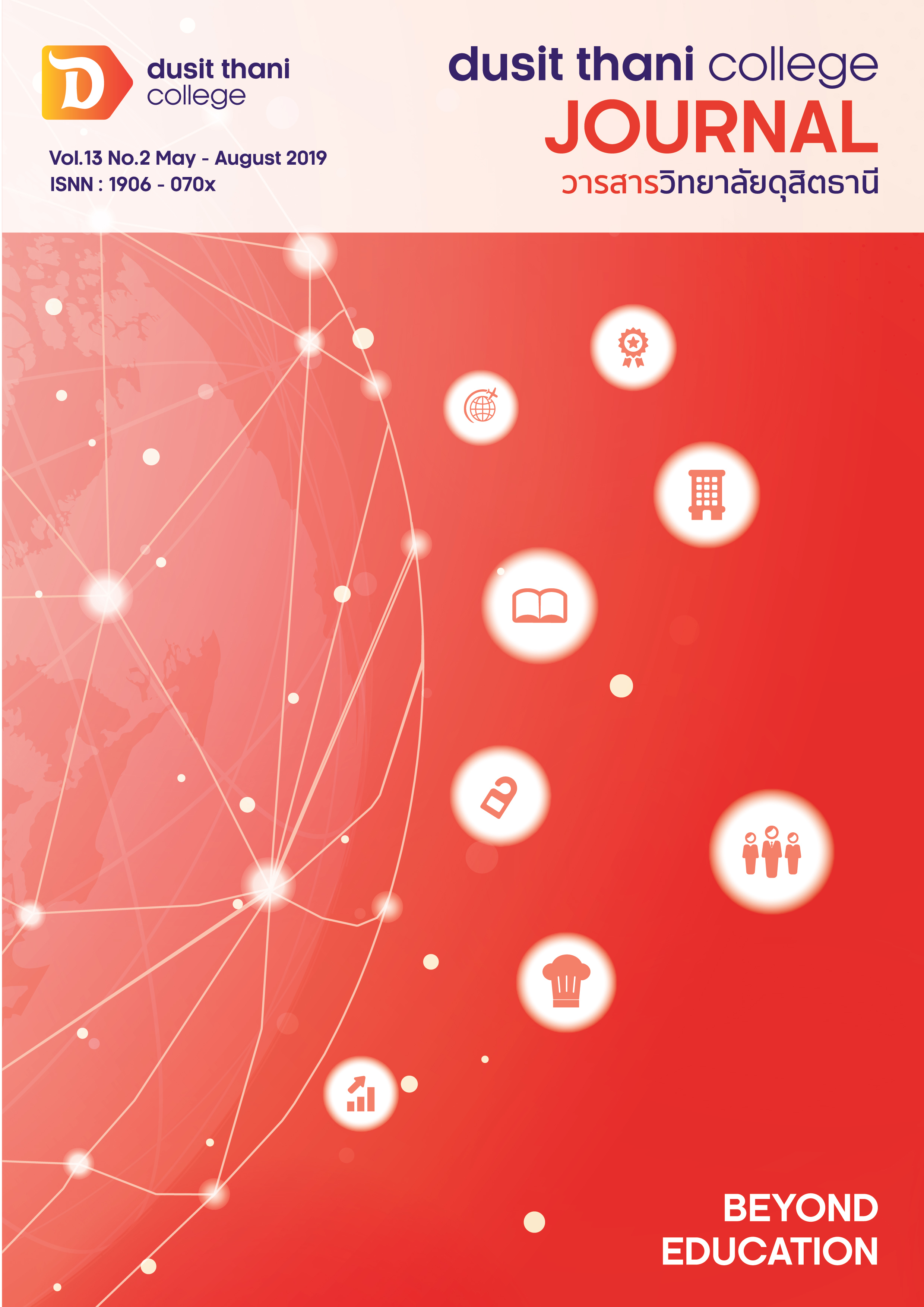Business Development Guidelines to Support Tourism Behaviours of Elders Travelling in Thailand
Main Article Content
Abstract
The increasing number of elderly population worldwide affects changes in various types of businesses including tourism in which elderly tourists are the group of tourists with high purchasing power. They spend longer to travel than other groups of tourists focusing on tourism and the receive of good quality services that are worth considering the price but not necessarily be the lowest price. They also give an emphasis on self-satisfaction and times when deciding on the attractions and services, thus they have a thorough and careful decision in buying and using the service. This abstract aims to impart the knowledge in literature related both Thai and international and finally brings into the important issues that will benefit the tourism-related sector in Thailand to see what should be improved or changed in terms of policies in supporting the opportunities from the increasing number of seniors in various countries around the world. Government agencies should support development of facilities whether in public transportation or information technology and promote a variety of language education to the people for the understandable communication. These reinforce traveling experiences for elders from various countries in all dimensions and more profound. For business sector, it should increase marketing promotion to target groups of potential elderly tourists organising popular tourist programs such as health tourism in which Thailand has the strengths in natural environment, cultural tourism with unique local wisdom and long-term travel that is worthwhile. There also should be public relations information that expresses the safety of tourism in Thailand with the principles of design that support travel and daily life of the elderly including travel safety, and Thai elderly care service with international service standards that the tourists will receive.
Article Details
Article Screening Policy
- All research and academic articles to be published must be considered and screened by three peer reviews in the relevant field / article.
- All articles, texts, illustrations and tables published in the journal are the personal opinions of the authors. Editors don't always have to agree. And no responsibility whatsoever is the sole responsibility of the author.
- The articles to be published must never be published. Where did you first publish? And not in the consideration of other journals If the audit found that there has been a duplicate publication It is the sole responsibility of the author.
- Any article that the reader sees as being plagiarized or impersonated without reference. Or mislead the work of the author Please let the journal editor know it will be your greatest blessing.
References
2. Aneksuk, Boonyasarit. (2017). Slow Travel: A concept Survey. Journal of Humanities and Social Sciences, Rajapruk University, Ubon Ratchathani University, 8(1), 26-47.
3. De Aguiar Eusebio, M.C., Aibeo Carneiro, M.J., Kastenholz, E., Dourado Alvelos, H.M. (2012). Potential Benefits of The Development on An European Programme of Social Tourism for Seniors. [online] Retrieved from http://www.ecalypso.eu/webs/steep/web/documentos/DOC_2_4.pdf on 2 April 2019.
4. Duangdao, Yoshida., et al. (2018). Expectation and Satisfaction towards The Travel in Thailand of Japanese Elderly Tourists. Journal of Thonburi University. 12 (Special Issue), 127-137.
5. Manyarom, Mongkol. (2015). Law for Senior Tourism. [online] Retrieved from http://www.bangkokbiznews.com/blog/detail/634497 on 9 April 2019.
6. MGR Online. (2017). The tourism market for the elderly is about 200,000 million baht. [online] Retrieved from https://mgronline.com/business/detail/9600000001108 on 11 April 2019.
7. MGR Online. (2017). Inviting the elderly to enjoy with many privileges from AirAsia. [online] Retrieved from https://mgronline.com/travel/detail/9600000053206 on 10 May 2019.
8. Ministry of Tourism and Sports. (2016). Ministry of Tourism & Sports 4th Strategic Plan. [online] Retrieved from https://www.mots.go.th/ewt_dl_link.php?nid=9689 on 1 March 2019.
9. On-Arun, Khaothip. (2010). Factors Affecting Domestic Tourist Behavior of Senior Thai Citizens. Independent Study. Master of Economics (Business Economics). Department of Economics. Kasetsart University. 155 pages.
10. Sangkakorn, Korawan., et al. (2015). Tourism Management and Administration in the Upper North of Thailand for Supporting Senior Tourists. The Thailand Research Fund. [online] Retrieved from http://www.sri.cmu.ac.th/~ctrd/uploads/files/file_20171206_1512542336.pdf
on 1 March 2019.
11. Sniadek, Joanna. (2006). Age of Seniors - A Challenge for Tourism and Leisure Industry. Studies in Physical Culture and Tourism, 13(1), 103-105.
12. Sriampornekkul, Ladna., and Chuntuk, Thirawat. (2018), Quality Tourism for Senior Tourists. Journal of Humanities and Social Sciences, Rajapruk University, 4(1), 12 - 28.
13. Sukothai Thammathirat Open University. (2019). Definition: Elderly society. [online] Retrieved from https://www.stou.ac.th/stouonline/lom/data/sec/Lom12/05-01.html
on 1 March 2019.
14. U-paiboon, Jutiporn. (2017). เดินทางด้วยส่วนลด สิทธิสำหรับวัยเก๋า. [online] Retrieved from http://www.younghappy.org/th/promotion-senior/ on 10 May 2019.
15. Wattanakamolchai, Somyot., and Yim-On, Yaowalak. (2010). Senior Tourists: A Market with Potential for the Tourism Industry. Panyapiwat Journal, 2(1), 95-103.


